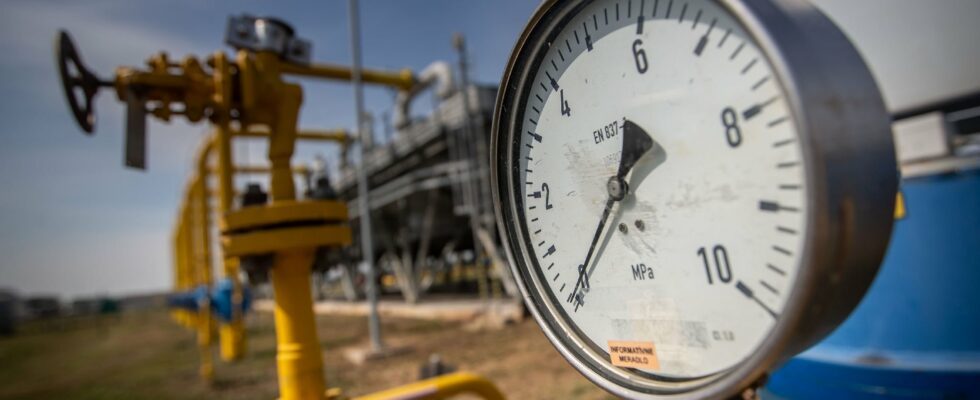2019. The newly elected Ukrainian President Volodymyr Zelensky welcomes the signing of an agreement synonymous with “energy security” and “prosperity for Ukrainians” with Russia, expected to bring the country “more than seven billion dollars” on five years. The terms of the contract established between the Ukrainian company Naftogaz and the Russian giant Gazprom are relatively simple: Ukraine authorizes its Russian neighbor to export its gas to Europe via its territory, in exchange for a large payment. But this five-year agreement, which was maintained despite Russia’s invasion of Ukraine, is now obsolete. And this, since January 1, 2025, kyiv having decided not to renew it and thus to definitively cease gas deliveries to Europe via its territory.
“We have stopped the transit of Russian gas, it is a historic event. Russia is losing markets, it will suffer financial losses”, welcomed this Wednesday the Ukrainian Minister of Energy, German Galushchenko, while Volodymyr Zelensky highlighted “one of Moscow’s greatest defeats”. “When Vladimir Putin took power in Russia more than 25 years ago, the annual volume of gas sent via Ukraine to Europe amounted to more than 130 billion m3. Today, the transit of Russian gas is at zero,” the Ukrainian president continued on social networks.
This ruling, supported by the European Commission, was also congratulated by Poland, one of kyiv’s closest allies. The head of Polish diplomacy, Radoslaw Sikorski, hailed “a new victory” over Moscow. “Vladimir Putin spent billions building Nordstream to bypass Ukraine and blackmail Eastern Europe by threatening to cut off gas supplies. Now Ukraine is preventing him from doing so. export gas directly to the EU”, he posted on X. Brussels for its part assured that “the EU is ready” to put an end to this agreement after having worked for “more than a year “to ensure that “other sources of supply are available”
The anger of Hungary and Slovakia
But for several other Eastern European countries, the termination of this contract, which concerns almost a third of total Russian gas deliveries to Europe, is a source of concern. In recent weeks, Hungary and Slovakia have complained in particular about seeing the tap cut off. Slovak Prime Minister Robert Fico, well disposed towards Vladimir Putin and whose country is very dependent on Russian gas supplies, warned this Wednesday January 1 of a “drastic impact on all of us in the EU”. This nationalist leader, who also threatened kyiv with retaliatory measures if it did not extend the agreement, also went to Moscow on December 22 to try to find an urgent solution, provoking the anger of Volodymyr Zelensky, who accused him of wanting to “help Putin”.
Hungary, for its part, receives most of its Russian gas imports via TurkStream, which passes under the Black Sea. If the cessation of transit via Ukraine will only marginally affect it, Prime Minister Viktor Orban assured that he “does not want to abandon” this route used for low volumes, he declared last week, in order to maintain “reasonable prices”.
Gazprom confirmed this Wednesday in a statement that “since 8 a.m., Russian gas has not been supplied for transit through Ukraine.” Its exports to Europe via Ukrainian territory amounted to just over 14 billion cubic meters per year, according to official figures. In this tense context, the price of European gas reached the symbolic mark of 50 euros per megawatt hour on Tuesday, a first in more than a year.
With the end of this transit and more than two years after the sabotage of the Nord Stream tubes in the Baltic Sea, Europe will now only be supplied with Russian gas by TurkStream, and its Balkan Stream extension. It also imports large quantities of Russian liquefied natural gas (LNG) by LNG tankers.
Moldova in danger?
But if a country is particularly threatened by this ruling, it is certainly Moldova, which has declared a state of emergency. Gazprom had announced the cessation of deliveries even before kyiv formalized the end of the transit contract, in the context of a financial dispute with this former Soviet republic with European aspirations.
Despite significant diversification efforts since the start of the war in its Ukrainian neighbor, Moldova still depends for 70% of its electricity on the Cuciurgan thermal power plant, located in the separatist region of Transdniestria and supplied with Russian gas via the ‘Ukraine. However, this has therefore seen its supply cut off by the cessation of imports of Russian gas. This region “is going through a difficult situation” after the local supplier Tiraspoltransgaz “interrupted the supply of natural gas and heating”, warned Moldovan government spokesperson Daniel Voda, calling on Russia to “stop its blackmail”.
“The Kremlin is once again resorting to energy blackmail in order to influence the 2025 legislative elections and weaken our European trajectory,” reacted President Maia Sandu, re-elected in November after a vote clouded by accusations of Russian interference . To the inhabitants of Transdniestria, who will find themselves without heating in the middle of winter, she offered “humanitarian aid” but the local authorities refused, hoping for a rapid resolution of the conflict.
Residents are invited to “dress warmly”, to “group in one room” and not to use homemade heating methods to prevent the risk of fire, according to a press release from an energy company. According to the authorities, 131 schools and 147 kindergartens had to be cut off from the network due to the supply interruption. The leader of the pro-Russian separatists, Vadim Krasnosselskiï, quickly recognized “a problem” and called an emergency meeting. The rest of Moldova is spared for the moment, notably thanks to help from neighboring Romania. But the situation in Transdniestria could very quickly spill over into a major humanitarian crisis as temperatures very regularly reach negative levels at this time of year.
